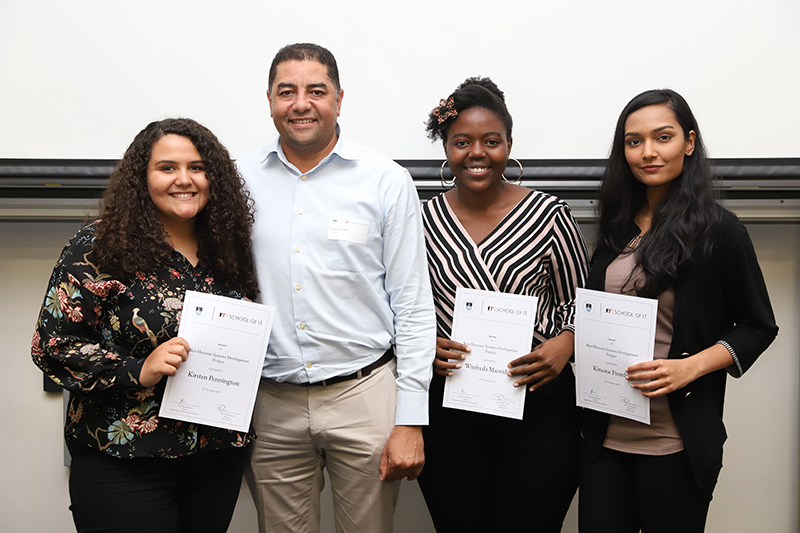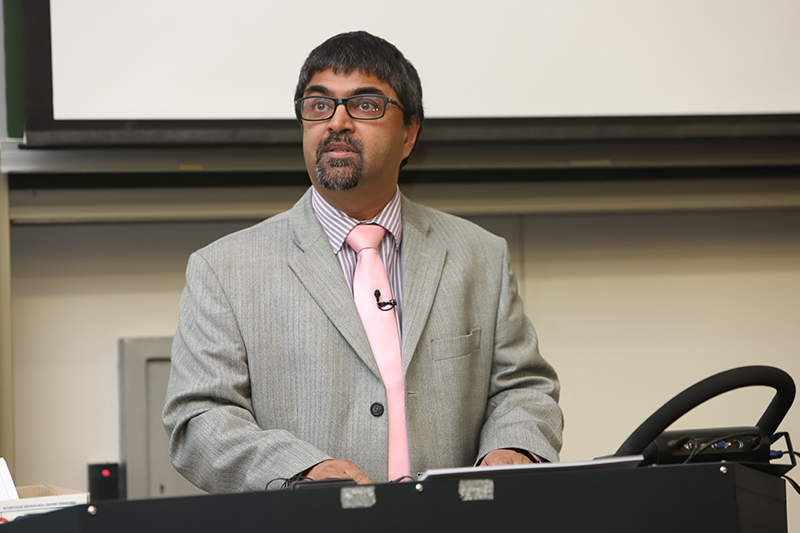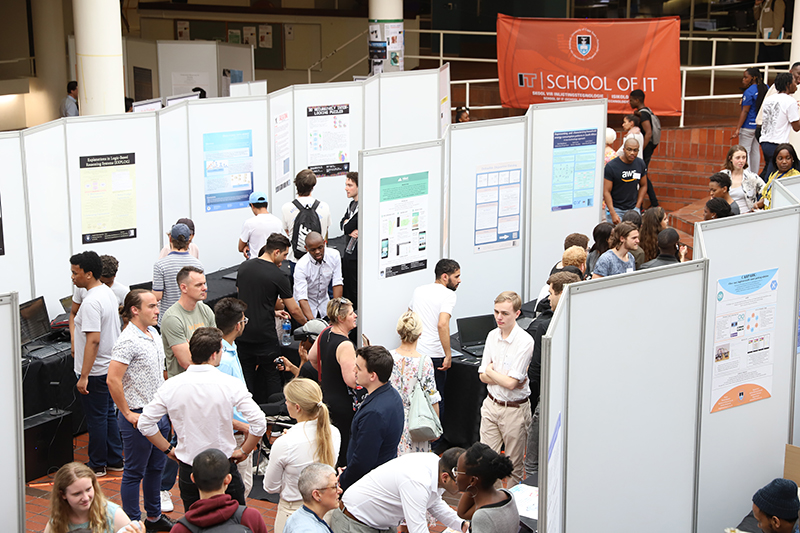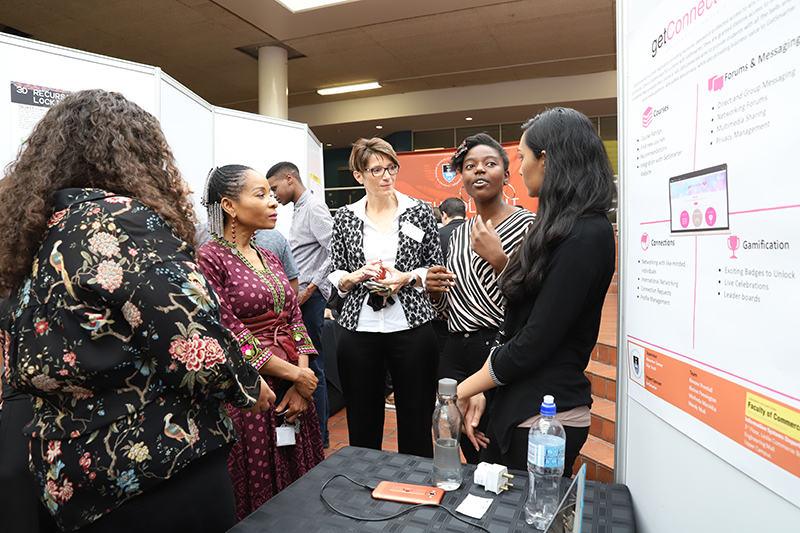New IT school already at home in 4IR
17 October 2019 | Story Helen Swingler. Photos Michael Hammond. Read time 8 min.
The Fourth Industrial Revolution (4IR) is not coming, it is already here, and the University of Cape Town’s (UCT) new School of Information Technology (IT) is already well positioned to prepare students, says its director Professor Ulrike Rivett.
Rivett was speaking this week at the official launch of the school, which opened last year and which merges the innovative technological and multidisciplinary capacities and knowledge of the faculties of Science, Commerce and Humanities. The faculties of Law, Engineering & the Built Environment and Health Sciences are also developing programmes within the school.
The launch was accompanied by the annual School of Information Technology Showcase, a “show and tell” involving senior student projects and innovations, as well as the award of annual certificates and class medals.
Guest speaker at the launch, UCT’s chief operating officer Dr Reno Morar, said the students’ showcase and awards provided a more concrete picture of the relationship between UCT and technology, and especially the university’s commitment to excellence.

Multidisciplinary partnerships
He added that the School of IT embodies one of UCT’s strongest principles: the importance of multidisciplinary partnerships in approaching today’s complex problems.
“Because it is a virtual school, based not in a building but in a data cloud, it’s reach can encompass many different disciplines.”
“Because it is a virtual school, based not in a building but in a data cloud, it’s reach can encompass many different disciplines. That is a strength that I believe will serve not only South Africa but the continent, because the School of IT graduates will be able to speak into different facets of society and address different problems.”
The school’s students will learn from academic and industry experts and partners in fields such as artificial intelligence, computational geometry for 3D printing and data science.
Importantly, the school’s offerings are not confined to students with advanced mathematical or scientific skills, Morar said. For example, a matriculant without mathematics can register for informatics and participate in the technological changes of the future.
“They will be able to earn a degree such as a BA in Informatics from the humanities faculty or do a double major in computer science or information science and psychology, or any of the languages,” he said.
“Such a qualification can equip UCT graduates to apply technology to their future work. This will not only help them in developing their career, it can also help their clients and employers. It can also help South Africa to grow in the new world that 4IR is creating.”

He added that the school’s graduates would not only keep up with changes in the wake of 4IR but would help initiate them in the sectors where they will be working.
Global digital industry
“South Africa’s economic and social development depends on being able to contribute to the global digital industry and our graduates will be at the forefront of that combination of skills.”
While UCT’s mission focuses on teaching and learning it also includes cutting-edge, socially responsive research. The School of ITʼs rigorous research programmes, such as the Hasso Plattner Institute (HPI) Research School, serve as a gateway for training sub-Saharan information technologists to design computational solutions and systems to address the United Nations Sustainable Development Goals.
“South Africa’s economic and social development depends on being able to contribute to the global digital industry and our graduates will be at the forefront of that combination of skills.”
Technological change has been shaping the world for some time and the IT sector is the fastest growing sector in the world.
“Everyone who uses a smartphone is part of that growth. We don’t have to wait for innovative apps to trickle down to South Africa,” Morar said.
Already UCT students are leading the way by developing and driving those apps and their growth. For example, last year saw the launch of UCT’s Developer Student Club, initiated by Google Developers. It corrals students who want to learn more about web and app development while at the same time finding tech-based solutions to issues in society. Others have developed apps as solutions to food waste, water savings, language barriers, and many more.

UCT student entrepreneurs are also putting their technology learning to good use in new businesses that serve South Africans. Mvelo Hlope and Denislav Marinov won prizes from the national Entrepreneurship Intervarsity Competition in September for technology applications they developed during their studies.
“These students are examples of UCT’s response to 4IR: We’re not going to wait for the changes it will bring, but we’re going to lead the change,” said Morar.
“The School of IT is the latest example of UCT’s mission to create positive change to serve our society.”
Core skills changing
Technology has already shaped the way we live and relate to one another. The banking sector, which is expected to lay off thousands of employees after smartphones revolutionised banking, is one example. Other industries and sectors are experiencing similar challenges.
“The World Economic Forum projects that more than 42% of the core skills required to perform most roles will change in the next five years.”
“The World Economic Forum projects that more than 42% of the core skills required to perform most roles will change in the next five years,” said Morar.
Governments and companies are preparing for what the World Economic Forum calls a “strategic redesign of the talent ecosystem”.
“This is why the government has committed, for instance, to introducing digital technologies in basic education.”
While 4IR will have far-reaching impacts on social interaction and sociological disconnection by reducing human-to-human interaction, many of the outcomes are focused on social development.
One example is UCT’s Information and Communications Technologies for Development (ICT4D) unit, part of the new School of IT’s community development work. The unit harnesses information and communication technologies to create solutions for the developing world. The Abalobi mobile app is used by small-scale fishers, mainly from low-income and poorly resourced regions, to help them market their daily catches more efficiently and cost-effectively.

Community service
Community service is compulsory in many of the school’s honours-level programmes. The school is active in community development activities such as coding, in partnership with Codespace, held on campus to introduce learners to computer programming and robotics.
“4IR will not remove UCT’s calling to social responsiveness. If anything, it is ramping up the need for socially responsive research and interventions because 4IR is forecast to increase inequality around the world,” said Morar.
“It’s easy to fall into the habit of seeing technology as a big wave, even a tsunami, that will wash across our lives and change our landscape irrevocably. What many people don’t remember is that technology is human-made and dependent on our application of it. That is where we have a choice and the training provided by the new School of IT strengthens our ability to make socially responsible choices.”
He concluded: “The School of Information Technology provides a strategy for students and researchers to not just serve technology but to serve our communities and our country.”
 This work is licensed under a Creative Commons Attribution-NoDerivatives 4.0 International License.
This work is licensed under a Creative Commons Attribution-NoDerivatives 4.0 International License.
Please view the republishing articles page for more information.




























































































































































































































































































































































































































































